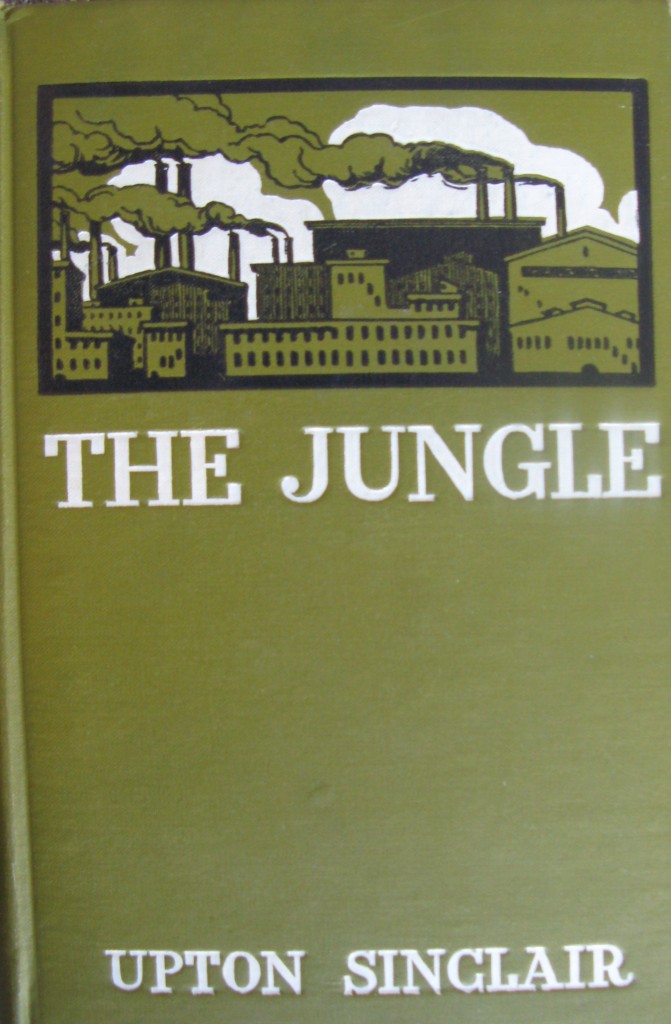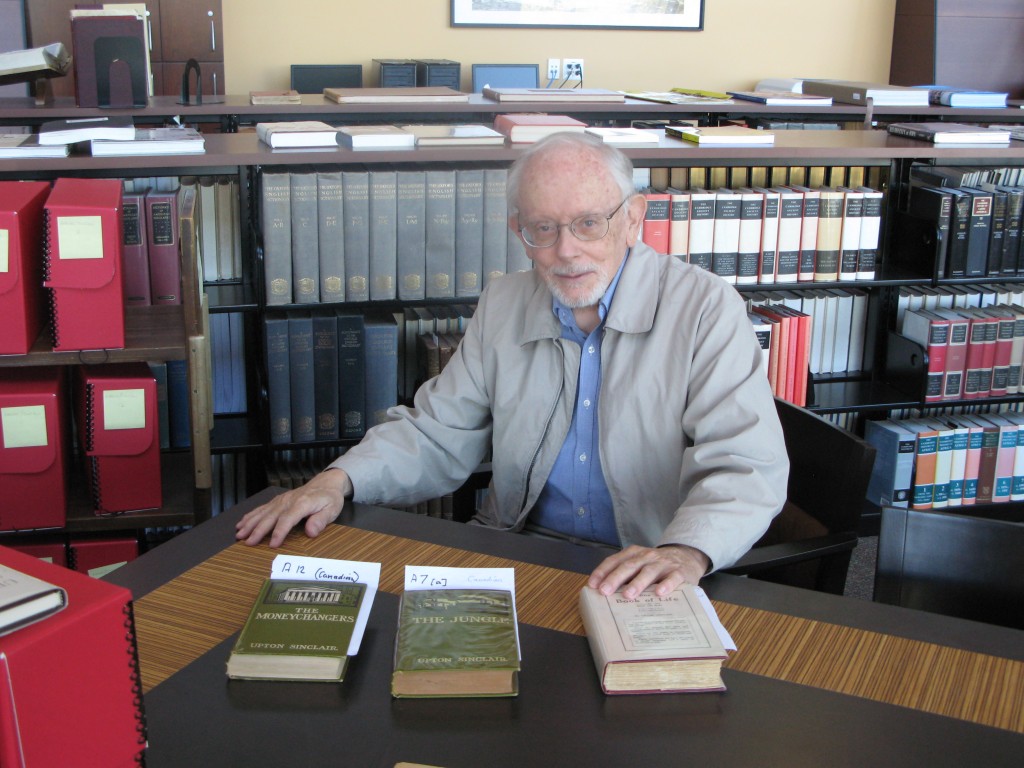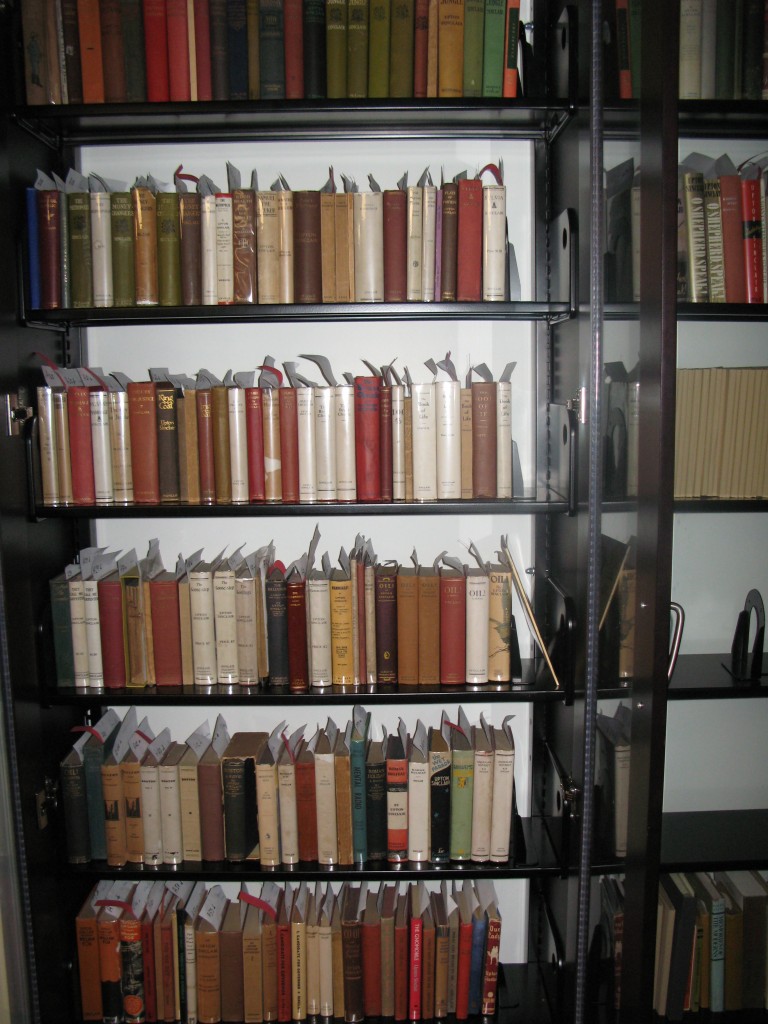
Reposted from the Archives and Special Collections blog.
The Archives and Special Collections Department in the Library at CSU Dominguez Hills has received a generous donation of a collection relating to author Upton Sinclair (1878-1968). One of the most prolific authors of the 20th century, Sinclair saw “The Jungle,” his muckraking novel exposing the meat packing industry, lead directly to food and drug reforms following its sensational reception in 1906. “The Jungle” is still taught in classes all over the world.
John Ahouse, a Sinclair bibliographer, scholar, collector and enthusiast has donated at least 320 books (consisting of multiple editions of nearly every Sinclair title), about 100 pamphlets, over 80 flyers, original magazine articles, tapes, manuscripts by Sinclair as well as by various biographers, newspaper clippings and entire issues of periodicals with Sinclair’s work and 14 boxes of research material. Included in the research materials are newspapers from Sinclair’s EPIC (or End Poverty in California) campaign for governor in 1934.
The collection also consists of first editions, rare editions, hardcover, paperbacks, serialized novels, magazine copies and later popular and academic editions of most of the nearly 100 titles Sinclair published in his lifetime. In addition there are books with introductions by Sinclair, books by his wife, biographies and foreign language editions.
A symposium on Upton Sinclair and the Ahouse/Sinclair Collection is being scheduled in conjunction with the CSU Dominguez Hills Labor, Social and Environmental Justice Fair on April 24, 2014, at 5:30 p.m. An exhibition based on the collection is also planned to open in April 2014 in the Library’s Archives and Special Collection department.
“This is wonderful and generous gift for CSU Dominguez Hills,” said CSUDH Library Dean Sandra Parham. “The potential for scholarship both for faculty and students is enormous. There are many opportunities public programming as well as for CSUDH students to do research.”

Ahouse, a former archivist at CSU Long Beach and librarian at USC, brought the collection to CSUDH because of its state of the art archival facilities as well as the interest expressed by faculty and staff. Ahouse’s book, “Upton Sinclair, A Descriptive, Annotated Bibliography” (Mercer & Aitchison, 1994) is used by librarians and booksellers throughout the world.
“Learning about the modern library facilities at CSUDH, and making the acquaintance of your very knowledgeable archivist, the thought began to grow of placing the collection where I know it will be used,” Ahouse said.
“It’s exciting to have a unique collection of Upton Sinclair publications, newspapers, flyers, letters, posters and other ephemera come to the Special Collections at the CSUDH University Library. Visitors to the collection will find it fascinating to see the broad spectrum of Sinclair’s interests–from the oil and meatpacking industries to marriage and mental telepathy, and of course his political campaign to end poverty,” said Dr. Vivian Price, associate professor of interdisciplinary studies/PACE and coordinator of labor studies. “So much of these materials are revealing for their content as well as what they represent as primary sources or historical artifacts,”
Asked about his interest in Sinclair, Ahouse recalled, “Although it would be difficult not to have heard of Upton Sinclair in high school or college, thanks to the evergreen status of ‘The Jungle,’ I arrived in 1978 in Los Angeles because of a career move from New York with no awareness that ‘Uppie’ had ever become a Californian, had even run for governor of the state, or had launched a broadly scoped series of historical novels, the ‘Lanny Budds,’ from a reclusive residence in nearby Monrovia. What’s more, Sinclair had lived for a time in Long Beach, where I made my home for the next thirty-five years. I needed to know more about this congenial ‘democratic socialist’, and the Sinclair collection was the result.”
Ahouse also notes in the introduction to his bibliography that “Sinclair the publicist and reformer had written uninterruptedly through three generations of social turmoil in America; few were the years between 1901 and 1962 without a new book–often two–from Upton Sinclair. Larger works were interspersed with minor publishing, from chiding letters-to-the-editor to the crusading pamphlets and book-length essays that made him a fixture of the political Left and the irrepressible gadfly among American writers in the first half of this century.”
Sinclair’s manuscripts, correspondence and archival collection are located at Indiana University. A handful of academic libraries such as Occidental in Los Angeles and the John Rylands Library in Manchester England have important Sinclair book collections.
“The collection increases the depth of our early 20th century literature holdings in our Rare Book collection,” said Greg Williams, director of archives and special collections at CSU Dominguez Hills. “It is complementary to our California history collections, early 20th century bestseller collection as well as the collection of books published by one of Sinclair’s publishers, Boni & Liveright. Students focused on the Humanities, History, English, Political Science, Labor Studies and many other disciplines will be able to take advantage of this research collection.”
The Ahouse/Sinclair collection is fascinating in its depth, potential for scholarship and its revelations about 20th century literature, politics and social activism. Sinclair’s scope of work is not only national and international but also brings a good deal of material about California and the Los Angeles area including Long Beach, Signal Hill, Pasadena and Monrovia. His novel, “Oil!,” is the basis for the film “There Will Be Blood.” His only children’s book resulted in the Disney film, “The Gnome Mobile.”
“The Jungle passed the century mark in 2006, and a colleague of mine at CSU Northridge, Professor Anthony Arthur, was under contract from Random House to write an up-to-date biography of the famous writer, “ Ahouse said. “We teamed up on the research end, and when the book duly appeared for the anniversary, I couldn’t help feeling that my collection had fulfilled much of its purpose.”

Titles include: “The Jungle” (1906, meatpacking industry); “The Moneychangers” (1908, high finance); “Good Health and How We Won It” (1909, healthy diet); “Prince Hagen, A Drama in Four Acts” (1909, finance); “Love’s Pilgrimage” (1911, marriage); “King Coal” (1917, Ludlow Massacre of 1914); “The Profits of Religion” (1918, organized religion); “The Brass Check” (1920, newspaper business); “Money Writes!” 1927, publishing); “Oil!” (1927, oil industry); “Boston” (1928, Sacco and Vanzetti novelization); “Mental Radio” (1930, telepathy); “Upton Sinclair Presents William Fox” (1933, film industry), “I, Governor Of California And How I Ended Poverty” (1934, EPIC campaign for Governor); “I, Candidate for Governor and How I Got Licked” (1935, losing the Governor’s race); “The Gnomobile” (1936, his only children’s book); “Wally For Queen!” (1936, British Monarchy); “No Pasaran!” (1937, Spanish Civil War); “The Flivver King” (Henry Ford/auto industry); “Little Steel” (1938, Steel labor issues); 11 “World’s End” novels (1940-1948) with hero Lanny Budd.
The collection also includes a great deal of books associated with Sinclair. These include a set of small books by Altadena heiress, millionaire and “parlor provocateur” Mrs. Kate Crane-Gartz. The books, edited by Sinclair’s wife, Mary Craig Sinclair, often consisted of letters written to prominent people such as President Warren G. Harding and Eugene Debs. Another set of books variously titled “Out of the Frying Pan, Ham and Eggs for Californians,” and “Highway to Prosperity” focus on the needs for old-age pensions during the 1930s. There are also books by poet and Sinclair friend, George Sterling; books by poet and lover of Sinclair’s first wife, Harry Kemp; a couple of books owned by Mary Craig Sinclair; a copy of “The Packers, The Private Car Lines, and the People,” ghost written for J. Ogden Armour, the owner of the meatpacking company Sinclair exposed in “The Jungle;” and a copy of “I Was Hitler’s Doctor” by Dr. Kurt Krueger
Also included in the collection are copies of original magazines such as Argosy, the American Mercury, The Bookman, Labor Defender, Literary Digest, Time (cover story on Sinclair), Helios, Liberty Magazine, and Haldeman-Julius Quarterly, in which Sinclair’s work appeared; other periodicals with views of Sinclair or his work; Upton Sinclair’s magazine; news clipping about Sinclair’s work or his social activism; sheet music from Sinclair’s campaign for Governor in 1934; various manuscripts or excerpts from theses or other studies on Sinclair; issues of The Epic News (1939-1941); a Sinclair manuscript entitled, “Zillions of Dollars: A Truth Story,” 1953; another manuscript entitled “Doctor Fist,” 1955; articles on Sinclair by CSUDH Emeriti History Professor Dr. Judson Grenier (the Archives has an interview between Grenier and Sinclair from the early 1960s); manuscripts of plays about Sinclair, book catalogs, and audio and video tapes
Subject files include materials on Sinclair as well as researchers interests. Included are files on the ACLU, biographer Lauren Coodley, Robert Hahn, filmmaker Julian “Bud” Lesser, author Greg Mitchell, David and Jean Sinclair, Irving Stone, the End Poverty in California (EPIC) campaign, homes of Sinclair, copies of and original letters, Liberty Hill, Long Beach, movies, obituaries, the Upton Sinclair Quarterly, Signal Hill, “Oil,” Theater, Upton Sinclair newsletters, “World’s End” and manuscript drafts of “Radical Innocent: Upton Sinclair,” the 2006 biography of Sinclair (dedicated to John Ahouse), by Anthony Arthur.
A collection finding aid will be created in the next year. Each book will be cataloged and included in the CSUDH library catalog. Students and faculty are invited to view or use open parts of the collection as well as tour the Archives and Special Collections Department. Classes are invited to the Archives for instruction on use of rare and primary materials.
For more information, contact Archives and Special Collections at (310) 243-3895